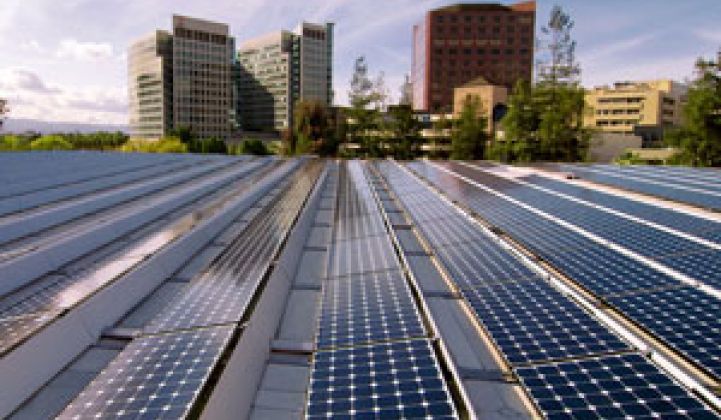Eight-hundred-and-three solar panels, tiled 10 degrees from the surface to get optimal sunlight, now sit above the Leonardo da Vinci exhibit at the Tech Museum of Innovation in San Jose, Calif.
The 185-kilowatt system is the first project for Helio Micro Utility, a one-year-old company from Berkeley, Calif., that owns and operates the system. The museum will only pay for the electricity generated.
Representatives from Helio and the Museum, along with San Jose Mayor Chuck Reed, gathered at an adjacent rooftop Friday morning to switch on the system, which is billed as the first on a commercial building in downtown San Jose.
San Jose's own SunPower Corp. provided the panels and oversaw the installation of the system, which will provide about 10 percent of the museum's power needs. The museum also intends to use the system as an educational tool.
"Standing on this spot, I can see 30 projects taking place around me," said Tim Choate, Helio's chief marketing officer, after the ceremony.
Indeed. Helio represents a growing number of entrants in a new market that represents huge opportunities for financing, installing and operating solar energy systems located at homes and businesses (see SunRun Races for Residential Customers and Suntech Buys EI Solutions, Teams Up with MMA).
Home and business owners, in return, pay a fixed monthly rate (or other financial arrangements) for the electricity generated,.
Solar energy systems are too pricy for many to own outright. A 4.5-kilowatt system costs about $36,000, according to Xcel Energy, the largest utility in Colorado.
The model used by Helio and others wouldn't work so well without government help, however. An increasing number of cities and states now offer rebates or tax credits for solar. A new federal law that will take effect in January will offer tax credits that cut 30 percent off a solar energy system's cost.
In fact, Helio was born around the time when Berkeley city officials were looking into creating a program to make solar energy systems more affordable for its residents and businesses, Choate said. Berkeley just recently started that program (see Berkeley to Launch Solar Financing Program).
Helio has lined up Citi Community Capital for funding projects such as the one at the Tech Museum. Citi has committed capital for 20 megawatts worth of projects in the commercial and residential market, said Choate, who declined to disclose the amount of money Citi will provide.
The focus now will be to develop projects for nonprofit organizations and affordable housing owners and developers, Choate said.
Helio snagged the Tech Museum project after approaching SunPower, which spent more than a year to put together the project and needed a financing partner. Helio's vice president of project finance, Greg Rosen, worked for SunPower before joining Helio.
Helio is working on several other projects in the Bay Area and Los Angeles, though Choate declined to provide more details.



